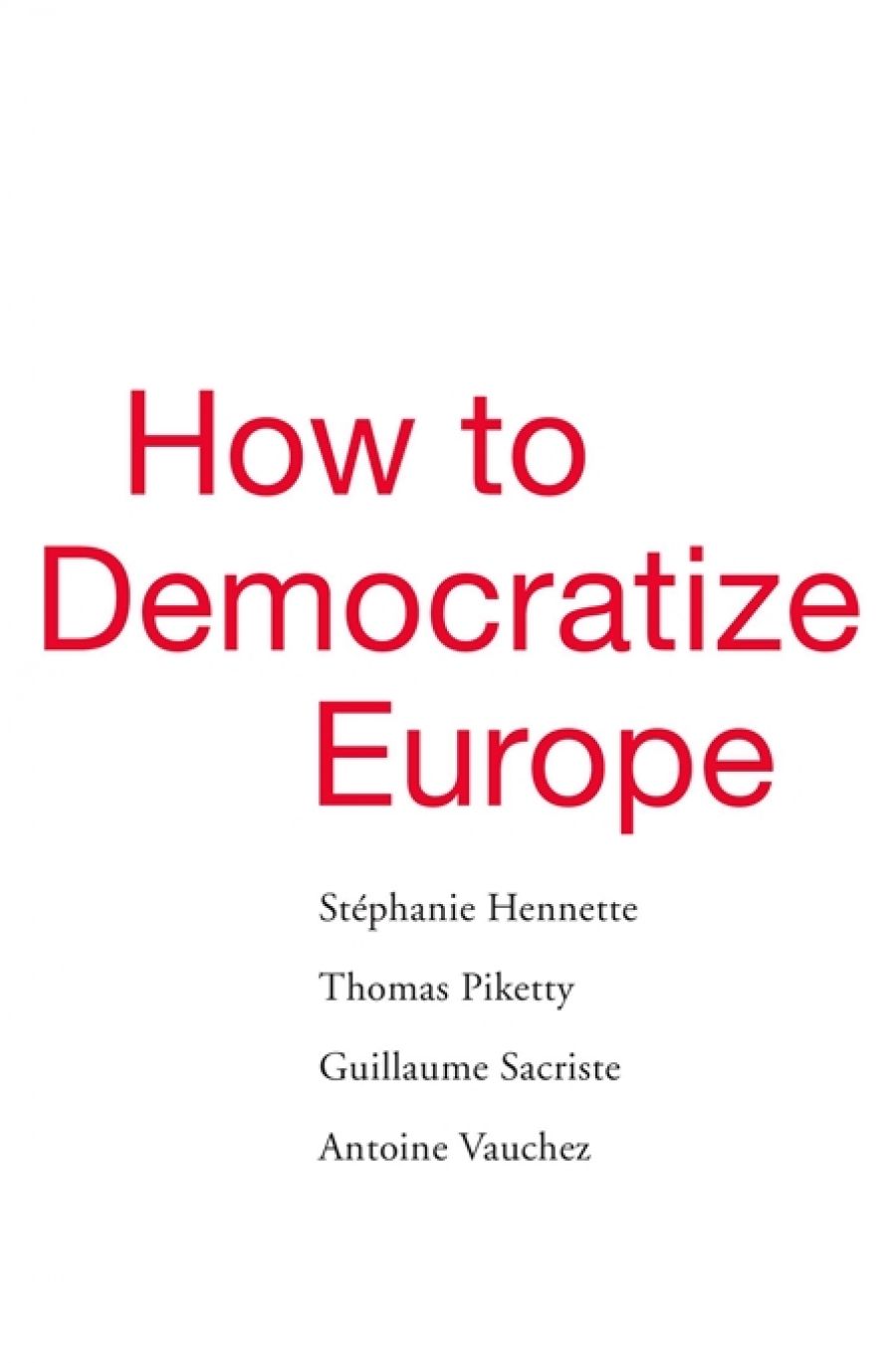
- Free Article: No
- Contents Category: Politics
- Review Article: Yes
- Custom Highlight Text:
The import of this book is best summed up by pinching one of its section headings: ‘another Europe is possible’. In this other Europe, this better one, the ‘democratic deficit’ that has bedevilled the European project from the outset has finally found a satisfactory resolution. A dream? Not at all. For the authors of this book, it is a ‘realistic utopia’, fully achievable if the right measures are taken. All that is needed is an agreement on a treaty and the dismantling of a Trojan Horse.
- Grid Image (300px * 250px):

- Book 1 Title: How to Democratize Europe
- Book 1 Biblio: Harvard University Press (Footprint), $49.99 pb, 224 pp, 9780674988088
The failures of European integration are often assigned to an unresolvable tension between the national and the supranational. Project Europe, we hear, is immobilised by the crosswinds created by state actors seeking to preserve their sovereignty and regional actors seeking to facilitate federation (Brexit being but the latest manifestation of this stasis). In Chapter One, Sacriste and Vauchez offer a different account of the troubles. After the agreement on Economic and Monetary Union (EMU), they suggest, an extramural governance structure emerged to manage the euro. The ‘central nucleus’ of this governance structure is a body called the Eurogroup, which operates in the ‘unmonitored space between the politics of member states and the politics of the European Union’. Comprising financiers from a range of national and supranational institutions, but all schooled in the same monetary principles, the Eurogroup and its affiliates operate as an unaccountable transnational fraternity whose power over the eurozone has grown exponentially since the sovereign debt crisis. To Sacriste and Vauchez, it is a ‘democratic black hole’. By virtue of its technical expertise, the Eurogroup has marginalised the parliaments (national and European) and reordered the European project after its own image: austerity before welfare, economy before society. ‘T-Dem’ belongs to what, following Karl Polanyi, might be called the countermovement against this financial reordering, or ‘euro-ization’, of Europe.
The purpose of ‘T-Dem’ is to create a Parliamentary Assembly of the Euro Area (separate from the European Parliament), one capable of exercising political oversight over the process of monetary union. Membership of this Parliamentary Assembly would comprise a mixture of representatives from national parliaments (eighty per cent) and the European Parliament (twenty per cent), with the number of seats from each of the member states being determined on the basis of population. By incorporating elected representatives from the states of the eurozone into the Parliamentary Assembly, the proposers of ‘T-Dem’ hope simultaneously to borrow legitimacy from the national parliaments and refigure the European project as an extension of the democratic sovereignty of peoples. Not implausibly, ‘T-Dem’ is being sold to member states as the ‘democratic compact’ needed to counterbalance the ‘fiscal compact’ of EMU.
The respondents collected in this volume overwhelmingly support the diagnosis of a ‘democratic emergency’ provided by the editors. All of them agree that governance of the eurozone has become less transparent and accountable since the sovereign debt crisis and that ‘another Europe’ is not only possible but necessary. Indeed, for Jeremy Adelman and Anne-Laure Delatte, ‘T-Dem’ holds out the promise of the ‘constituent moment’ Europe never had – the moment when it finally found itself as a democratic polity. None of the others is quite so enthused by the remedy. The concerns range widely. How will the new Assembly relate to the existing European Parliament? How are the legislative powers of the Assembly to be shared with the Eurogroup? Can these legislative powers be exercised without encroaching on the national parliaments? Wouldn’t it be better to appoint a ‘euro-area finance minister’, responsible to the European Parliament, to oversee monetary union? Might not the Assembly deepen divisions between the eurozone and the rest of the EU? Would the ‘T-Dem’ gain the approval of the German Constitutional Court? And so on.
Precisely where the technical stops and the political begins can be difficult to work out here. Although everybody declares their allegiance to principles of transparency and accountability, technical questions relating to the institutional architecture of the EU play a subtle role in obscuring the political stakes. Exactly what vested interests are being protected in this discussion about the best way to democratise Europe would take some time to work out.
The more of this commentary one reads, the more one wonders whether the ‘T-Dem’ is quite as radical as it first appears. Assembly – the gathering of the people – has long enjoyed a special aura in theories of emancipation. But it is difficult to suppress the feeling, stoked by essays from Christian Joerges and Iphigénie Kamtsidou, that representative institutions are insufficient to combat the power of finance capitalism. Why should this ‘chamber of national chambers’, as Pierre Moscovici describes it, prove more effective than its domestic counterparts in curbing executive/financial rule and restoring the constituent power of the people? By reducing the problems of Europe to the power exercised by a small but unaccountable financial élite (that secretive Eurogroup), the editors may have exaggerated the difference that political oversight of euro-area governance could make. Capitalism is surely much harder to tame.
Nevertheless, since lament over the power of an opponent can easily turn into self-justifying resignation, practical attempts to resolve the democratic deficit in Europe should not go uncredited. If ‘T-Dem’ ultimately seems inadequate to the democratic emergency, the editors can scarcely be faulted for seeking the democratic regulation of financial power. Their proposal (and the book debating it) deserves to be read carefully.


Comments powered by CComment